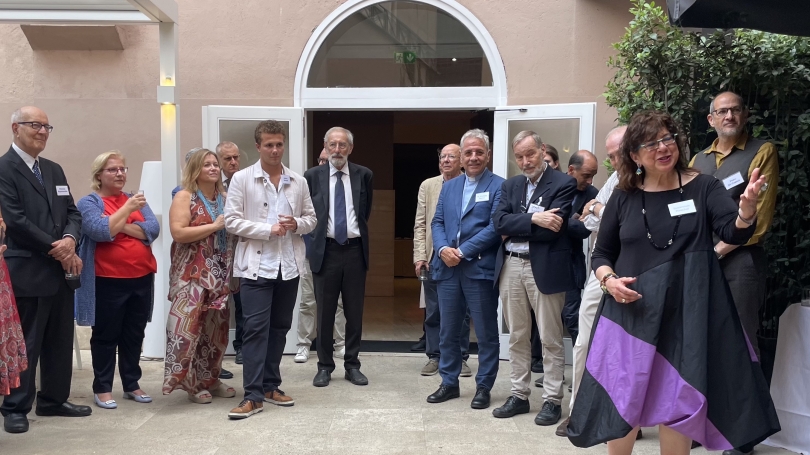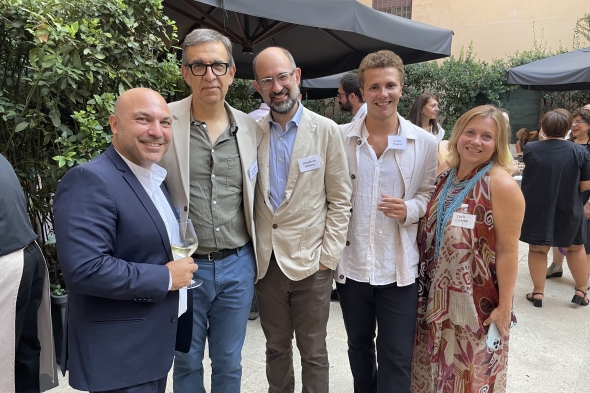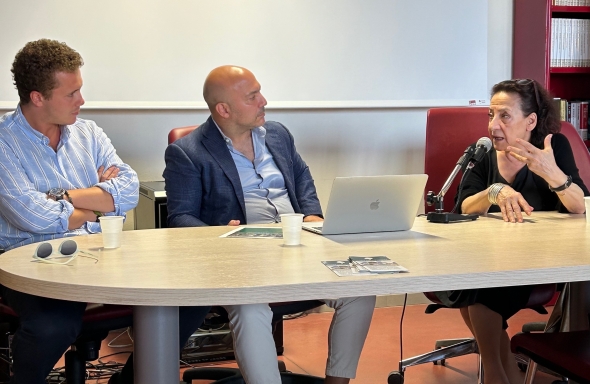

Middle Eastern studies and Jewish studies professors led discussions on interfaith dialogue and Middle East history with major religious and political leaders.
Building on their decades-long partnership and shared commitment to fostering joint academic inquiry, the Middle Eastern Studies Program and Jewish Studies Program hosted a week-long conference in Rome on interfaith dialogue and Middle East history.
Session themes included the Middle East in Italian media and politics; approaches to Middle East history and collaboration with Italian academia; teaching Middle East politics; and interfaith dialogue and Vatican diplomacy.
The series of events last week convened scholars with high-level political and religious leaders, including the grand rabbi of Rome, Riccardo Di Segni; Norbert Hofmann, secretary of the Holy See's Commission for Religious Relations with the Jews; the rector of the Catholic University of Lublin; Lia Quartapelle, member of the Italian Parliament who serves on the Committee of Foreign Affairs; novelist and 2023 Montgomery Fellow Hoda Barakat; and Brigitte Curmi, former French ambassador to Syria and Libya.
Dartmouth faculty were also joined by academics from institutions including La Sapienza, the Catholic University of Lublin, University of Texas at Austin, University of Venice, University of Rome Tor Vergata, Roma Tre, and the Gregorian University in Rome
The program was based at Dartmouth's Rome Center, which is situated in the historic center of the city, opposite the 16th-century Palazzo della Cancelleria. Dartmouth faculty also met with professors at local educational institutions and think tanks including Istituto Affari Internazionali and Luiss School of Government.
"Meeting and sharing ideas with political scientists, journalists, scholars of literature and religion, and policy makers helps us establish collaborative models that enable us to rethink Middle Eastern studies in light of new political realities," Middle Eastern Studies Chair Tarek El-Ariss says.
"Engaging in comparative U.S.-European perspectives has the potential to enrich our fields and perspectives and open new possibilities of exchange and transformation that are vital in the current moment," says Jewish Studies Chair Susannah Heschel.

El-Ariss and Heschel were joined by Dartmouth colleagues Jonathan Smolin, associate professor of Middle Eastern studies; senior lecturer Ezzedine Fishere; Victoria Holt, Norman E. McCulloch Jr. Director of the John Sloan Dickey Center for International Understanding; and Vice Provost for Academic Affairs Barbara Will.
"It is so exciting to see our Rome Center brought to life by the presence of our prominent Jewish and Middle Eastern scholars," Will says. "Rome has been a crossroads for dialogue and discussion throughout history, and is the perfect setting for our faculty to engage with scholars, religious leaders, and journalists from Europe and the Middle East. The connections we have made this week have been truly remarkable."
The initiative builds on the success of Dartmouth's Middle East Dialogues, a series of campus forums and workshops that launched soon after Oct. 7, 2023, as the Dialogue Project's first special topic series. The Dialogue Project provides training in the development of essential collaborative dialogue skills—fostering a community that cultivates the respectful and open exchange of ideas.

Dartmouth scholars also collaborated with Italian thought leaders last week on two additional symposia: On Literature and Translation: Arabic Literature in Catastrophic Times, co-hosted with Sapienza University of Rome, with Professor Ada Barbara; and "Interconnectedness, Dialogue, and Understanding," a public discussion on climate change at the Rome Center featuring Appleton Professor of Natural Philosophy Marcelo Gleiser and Sandrine Dixson-Decleve, co-president of Club of Rome.
André Bouzid '25 provided simultaneous translation for the discussion on Arabic literature.